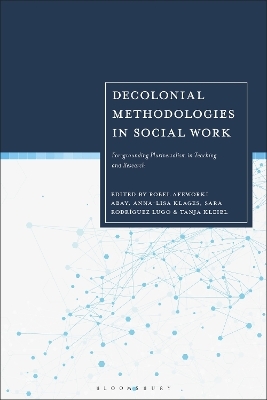
Decolonial Methodologies in Social Work
Bloomsbury Academic (Verlag)
978-1-350-41922-3 (ISBN)
- Noch nicht erschienen (ca. Mai 2025)
- Versandkostenfrei
- Auch auf Rechnung
- Artikel merken
This co-edited volume does just that, and in so doing, it reveals a thriving subcurrent of othered ways of researching and teaching social work. This in turn opens new spaces for teaching and talking about social work in a manner that is more just, culturally sensitive, and attuned to structural power relations. Furthermore, it calls new attention to structural power relations still at play in many of the best-intentioned attempts to decolonize methodologies and pedagogies: while the chapters gathered here question the assumptions and current directions of empirical scientific research and academic education, they also engage critically with the risks of cultural appropriation endemic to pluriversal approaches, themselves, appropriations that would ultimately reproduce the exploitation mechanisms they aim to resist.
For its thought-provoking, highly original attention to important, even foundational, but badly neglected issues within the field, this book is a must-read for all scholars and students of social work, and particularly for those interested in issues related to diversity, pedagogy, or the history of the profession. It is also of keen interest for practitioners wishing to cast a critical eye on their own education and practice.
Robel Afeworki Abay is a PhD fellow at Humboldt University of Berlin, Germany. Tanja Kleibl is Professor for Social Work, Migration and Diversity at University of Applied Sciences Wu¨rzburg-Schweinfurt, Germany. She is also the author of Decolonizing Civil Society in Mozambique (Zed Books, 2021). Anna-Lisa Klages is a research associate and PhD fellow at the BayWISS Academic Forum “Social Change” at the University of Applied Sciences Wurzburg-Schweinfurt, Germany, in affiliation with LMU Munich. Sara Rodríguez Lugo is a student assistant at the University of Applied Sciences, Wurzburg-Schweinfurt, Germany.
Introduction. Methodological and Pedagogical Implications of Decolonizing Social Work Research and Education - Anna-Lisa Klages, Sara Rodríguez Lugo, Tanja Kleibl, and Robel Afeworki Abay
Section 1. Decolonizing Social Work Research
1. A Counter-history of Social Work: Tracing Epistemic Violence in Social Work - Verena Grill and Van Hall Larenstein
2. Decolonial Research Methodologies and Practice Methods in South Africa’s Post-Colonial Social Work - Poppy Masinga and Karin Sauer
3. Power Relations within International Co-operations and Transnational Social Work - Nicolette Roman, Catherina Schenck, and Beatrix Schwarzer
4. Evidencing the Erasure: The Subaltern as a Writing Problem for Social Work, A Reading from the Peasant Women of Antioquia and Cundinamarca, Colombia - Ariel Camilo González Moreno and Laura Daniela Toncón Chaparro
5. Regenerative Practice in Social Work -Yari Or
6. The Ethnomethodology of Postcolonial Perspectives - Galina Gostrer
7. Intelligence, Coloniality, and Anti-colonial Social Work - Gurnam Singh
Section 2. Decolonizing Social Work Education
8. Favouring Indigenous Languages in Social Work Education - Thembelihle Brenda Makhanya
9. How do we address the colonial past, post-colonial present, and decolonial futures of the world in social work education and practice in Nigeria? - Nwafor Nneka Francisca, Ngozi Eucharia Chukwu, and Uzoma Odera Okoye
10. Epistemologies of the South and Teaching in Higher Education: Learning from the Chilean Uprising and Paulo Freire - Ramiro Lobatón
11. Decolonizing Social Work Study Programs: Alumni Experiences from Ghana and Germany; A Transnational Research Project - Theodora Elorm Amlado, Jasmin Goldhausen, Inusah Karim, Lara Lehmann, and Franziska Neureither
12. Decolonizing Social Work Curricula in Higher Education: A Continuous Journey - Neil Bilotta, Theresa Palmer, Allison De Marco, Laurie Selz-Campbell, Travis Albritton, and JP Przewoznik
13. Exploring the ‘Decolonial Mindset’ as a Teaching Premise: Students’ and Lecturers’ Experiences from a Research-based Seminar - Sandra Holtgreve, Lisa Mends, and Nina Westerholt
14. To Do or to Be: Problem-posing as Decolonization in the Social Work Classroom - Vincent Wijeysingha
15. Postcolonial Perspectives as a Necessary Part of a Professional Self-understanding of Social Workers: Suggestions for Curricular Adjustments - Philipp Seitz
| Erscheint lt. Verlag | 15.5.2025 |
|---|---|
| Verlagsort | London |
| Sprache | englisch |
| Maße | 156 x 234 mm |
| Themenwelt | Geschichte ► Teilgebiete der Geschichte ► Wirtschaftsgeschichte |
| Sozialwissenschaften ► Pädagogik ► Sozialpädagogik | |
| Sozialwissenschaften ► Soziologie | |
| ISBN-10 | 1-350-41922-2 / 1350419222 |
| ISBN-13 | 978-1-350-41922-3 / 9781350419223 |
| Zustand | Neuware |
| Haben Sie eine Frage zum Produkt? |
aus dem Bereich


